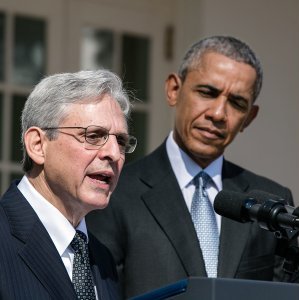 The reporting surrounding President Obama’s nomination of Merrick Garland as Supreme Court justice both reveals and complicates the concept of privilege in an intriguing manner. Many of the articles, such as this Politico piece, were notable for what they refrain from stating, that he is a white male. This contrasts with the emphasis on ethnicity and gender in earlier pieces about those being considered for the position, such as Attorney General Loretta Lynch and Judge Sri Srinivasan. After the Garland nomination announcement, one article noted Garland’s judicial experience and legal training and specified how he would not add diversity to the Supreme Court. The article continued, referencing Justice Sonya Sotomayor as Latina and Srinivasan as both Hindu and Asian-American. The choice not to relate Garland’s racial, ethnic, and gender identifications reflects the privilege of a white male in the United States.
The reporting surrounding President Obama’s nomination of Merrick Garland as Supreme Court justice both reveals and complicates the concept of privilege in an intriguing manner. Many of the articles, such as this Politico piece, were notable for what they refrain from stating, that he is a white male. This contrasts with the emphasis on ethnicity and gender in earlier pieces about those being considered for the position, such as Attorney General Loretta Lynch and Judge Sri Srinivasan. After the Garland nomination announcement, one article noted Garland’s judicial experience and legal training and specified how he would not add diversity to the Supreme Court. The article continued, referencing Justice Sonya Sotomayor as Latina and Srinivasan as both Hindu and Asian-American. The choice not to relate Garland’s racial, ethnic, and gender identifications reflects the privilege of a white male in the United States.
Gyanendra Pandey distinguishes between marked and unmarked citizens in his book Routine Violence. While such designations are not unique to Pandey, he emphasizes them in the context of India and the ways those identified as Muslim are commonly marked as Indian Muslims or Muslim Indians, whereas Hindus have the privilege of being unmarked; they are simply Indian. As evident in the focus on Garland’s ideology and judicial temperament (with no reference to demographic characteristics), being unmarked often means that people focus on someone’s qualifications and achievements without seeing that person first as a representative of a community, which quickly becomes homogenized and united into a singular collective.
Of course, what goes as unmarked in India is different than in the United States, where Srinivasan is doubly marked, both in terms of religion and ethnicity. Privilege, in that sense, is not a singular system but is context dependent. One element of the emphasis on ethnicity and gender revolves around being a first, Lynch would have been the first African-American female justice, and Srinivasan would have been the first Hindu, Indian-American justice. While being first is historic, being one among many is, of course, a sign of one type of privilege. One’s position in history, then, is more based on one’s contributions beyond being a symbol of opportunity and diversity.
The first articles that I saw on Garland’s pending nomination last week never mentioned his identification as a Jew. The failure to mention his religious identification raises the question if a Jew is also an unmarked citizen. Since Will Herberg’s 1955 book Protestant Catholic Jew, much discussion of religion in the United States focuses on those three religions as generally American, making being Jewish unremarkable and privileged, in contrast to being Hindu. However, Senator Bernie Sanders’ first primary victory in New Hampshire became remarkable, in some accounts, because he identifies as Jewish and was thus the first Jewish candidate to win a presidential primary. The prior presence of Jews on the Supreme Court, and the current presence of 3 justices who identify as Jewish, makes Garland’s religious identification less remarkable that Sanders’. The current court’s make-up confirms Garland’s privilege, as he would join six other justices whom we classify as white and 5 other justices whom we classify as male.
Of further interest, though, is the way Garland’s Jewish identification is represented. His family on his mother’s side is Jewish, while his father was Protestant, and Garland was raised as a Jew. The immigration of his grandparents from Eastern Europe becomes an enthralling component of his story and the only further reference to his ethnicity that I have seen. What is interesting, though, is that his father’s ethnicity or family background remains unremarkable (apparently Protestant and European-American) and just typically American. As this furthers the point about the privilege of being common and thus unmarked, it also becomes a corollary to the one-drop rule, as ancestry that diverges from those presumed to be unmarked American become important to highlight (sometimes positively, sometimes not), which further reinforces the privilege of the dominant, unmarked standard.
Photo credit: Merrick Garland speaks at his Supreme Court nomination with President Obama

An important point! It dovetails quite nicely, I think, with some of arguments in Isaac Weiner’s “Religion Out Loud.”